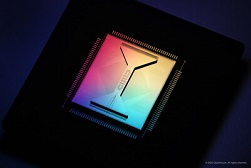Airbus, BMW Group and Quantinuum, world leaders in mobility and quantum technologies, have developed a hybrid quantum-classical workflow to speed up future research using quantum computers to simulate quantum systems, focusing on the chemical reactions of catalysts in fuel cells.
In a new technical paper, “Applicability of Quantum Computing to Oxygen Reduction Reaction Simulations”, the three partners report accurately modeling the oxygen reduction reaction (“ORR”) on the surface of a platinum-based catalyst. The ORR is the chemical reaction in the process that converts hydrogen and oxygen into water and electricity in a fuel cell and it limits the efficiency of the process. It is relatively slow and requires a large amount of platinum catalyst, so there is great interest and value in better understanding the underlying mechanisms involved in the reaction.
Using Quantinuum’s H-Series quantum computer, the collaboration team has demonstrated the applicability of quantum computing in an industrial workflow to enhance our understanding of a critical chemical reaction. The three companies plan further collaboration to explore the use of quantum computing to address relevant industrial challenges.
Dr. Peter Lehnert, Vice-President, Research Technologies at BMW Group stated: “Circularity and sustainable mobility are putting us on a quest for new materials, to create more efficient products and shape the future premium user experience. Being able to simulate material properties to relevant chemical accuracy with the benefits from the accelerating quantum computing hardware is giving us just the right tools for more speed in innovation for this decisive domain.”
As a pioneer in the global automotive market BMW Group recognizes the transformative potential of quantum computing and its importance in researching new materials, where it can enable faster and more efficient processes while reducing lab prototypes. Approaching and accurately simulating one of the most fundamental electrochemical processes for the first-time using quantum computing marks a substantial step towards the sustainable energy transition, benefiting metal-air batteries, and other products with enhanced efficiency.
Isabell Gradert, Vice-President, Central Research & Technology at Airbus said: “We can clearly envision the benefits of the study in our quest for sustainable and hydrogen powered alternatives such as the ZEROe aircraft, which may operate on fuel cell engines. The study confirms that quantum computing is maturing at the scale we need for aviation.”
Airbus has identified hydrogen as a promising candidate to power low-carbon aircraft, because it emits no CO2 when flying, when generated from renewable energy. The company previously announced plans to start testing a hydrogen-powered fuel cell propulsion system onboard its ZEROe demonstrator aircraft in the next few years. The company has the ambition to develop the world’s first hydrogen-powered commercial aircraft for market entry by 2035.
Ilyas Khan, Chief Product Officer, Quantinuum said: “We have been excited to be working for some time now to support the BMW Group and Airbus, both leaders in their fields, and both of whom recognize that quantum computing could play a pivotal role in advancing future sustainable mobility. In this pioneering work, we demonstrate how to integrate quantum computing into the industrial workflows of two of the world’s most technologically advanced companies, tackling material science problems that are a prime target for progress using quantum computing.”
The research team hopes that understanding the ORR reaction provides insights that help them identify alternative materials that may improve the performance and reduce the production costs of fuel cells. Modeling chemical reactions such as the ORR accurately is an intractable task for classical computers, due to the quantum properties of the chemical mechanisms involved, making such simulations a good candidate to benefit from a potential quantum advantage in the future.
Quantinuum is the world’s largest standalone quantum computing company, formed by the combination of Honeywell Quantum Solutions’ world-leading hardware and Cambridge Quantum’s class-leading middleware and applications. Science-led and enterprise-driven, Quantinuum accelerates quantum computing and the development of applications across chemistry, cybersecurity, finance and optimization. Its focus is to create scalable and commercial quantum solutions to solve the world’s most pressing problems in fields such as energy, logistics, climate change, and health.
The company employs over 480 individuals, including 350+ scientists and engineers, at eight sites across the United States, Europe, and Japan. The Honeywell trademark is used under license from Honeywell International Inc. Honeywell makes no representations or warranties with respect to this service.
With its four brands BMW, MINI, Rolls-Royce and BMW Motorrad, the BMW Group is the world’s leading premium manufacturer of automobiles and motorcycles and also provides premium financial and mobility services. The BMW Group production network comprises over 30 production sites worldwide; the company has a global sales network in more than 140 countries.
In 2022, the BMW Group sold nearly 2.4 million passenger vehicles and more than 202,000 motorcycles worldwide. The profit before tax in the financial year 2022 was € 23.5 billion on revenues amounting to € 142.6 billion. As of 31 December 2022, the BMW Group had a workforce of 149,475 employees.
The success of the BMW Group has always been based on long-term thinking and responsible action. The company set the course for the future at an early stage and consistently makes sustainability and efficient resource management central to its strategic direction, from the supply chain through production to the end of the use phase of all products.
Airbus pioneers sustainable aerospace for a safe and united world. The Company constantly innovates to provide the most efficient and technologically-advanced solutions in aerospace, defence, and connected services. In commercial aircraft, Airbus offers the most modern and fuel-efficient airliners. Airbus is also a European leader in defence and security and one of the world’s leading space businesses. In helicopters, Airbus provides the most efficient civil and military rotorcraft solutions worldwide.

